The FinTech Book
Contents
Preface
About the Editors
Acknowledgements
1. Introduction
Banking and the E-Book Moment
The Shifting Financial Landscape
An Unfinished Revolution
The Challenge to the Banks
The Utilities Risk
The Future for the Banking Sector
Why We’re so Excited About FinTech
How Did it all Begin?
More than a Fuss: What Does FinTech Bring?
FinTech in the Developing World: Starting from Scratch
Banks, Beware!
Disrupted, Reimagined
Current Trends in Financial Technology
Regulation Supporting the FinTech Sector
Wearables, Foreign Exchange (FX), Bitcoin, and Blockchain Trends
2. FinTech Themes
Banks Need to Think Collaboration Rather Than Competition
Global Compliance is Key
FinTechs Must Understand Each Local Regulatory Stack!
The United States: A Single Market with Complex, Multi-level Regulations
Europe: Still Complex but with Some Harmonized Regulations
Asia: Remains Very Fragmented
Payment Services are Globally Regulated
Local and Global Compliance – Make, Buy, or Partner?
Lending (Capital) in the 21st Century
Data and New Technologies are the Key to Unlocking Credit Globally
Lowering Costs, Increasing Transaction Frequency
Change is Coming, Past a Bank Near You
The Next Big Innovation in FinTech – Identity
If it Ain’t Broke, Don’t Fix it, Right?
Social Login
Twitter Digits
Apple Touch ID
Trulio
Tech Giants Becoming Non-Bank Banks
Design is No Longer an Option – User Experience (UX) in FinTech
UX DESIGN = Big Bucks
A Definition for UX
UX and FinTech
An Example: Password Fatigue
Seven Guidelines
Conclusion
3. FinTech Hubs
Nurturing New FinTech Communities
Lessons from a Leader
Location, Location, Location
La (French) FinTech Connection
France’s International Centre of Excellence in Science and Technology
France’s Entrepreneurial, Investment, and Tax Environments
France’s Regulatory Environment for Innovative Financial Services
France’s Strategic Business and Geographic Positioning
France’s FinTech Start‐ups Association
The Journey Towards an Integrated FinTech Ecosystem – The Netherlands
Netherlands in 2014
Seizing the Opportunity
The First Step
Early Choices
Business Model
Governmental Relations
Execution Challenge
International Relevance
Luxembourg, a Future FinTech Hub?
Vienna as the No. 1 FinTech Hub in Mobile Payments?
Specific Starting Basis for Mobile Payments
What Does this Mean for FinTech Start‐ups?
Local FinTech‐related Venture Capital Environment
Conclusion: Unlocking the Potential
India’s FinTech Ecosystem
Innovation Areas
A Collective Hub
Singapore, the FinTech Hub for Southeast Asia
Drivers of FinTech in Singapore
Singapore’s FinTech Ecosystem
Success Stories
Conclusion
4. Emerging Markets and Social Impact
FinTech – The Not So Little Engine That Can
Why Am I Not Gonna Be Able to Enter a Bank?
Supply‐side Factors
Demand Factors
The Rise of the Rest in FinTech
The Magic Cake
What Goes Around Comes Around
There is Something New Under the Sun
What is Really Happening?
Conclusion
Smartphones, FinTech, and Education – Helping the Unbanked Reach Financial Inclusion
Enhancing User Experience
New Product Development
Education: Power to the People through Financial Literacy
The Road Ahead
The Social Impact of FinTech in Nigeria
Consumer Safety and Security
Contributions to State Monetary Policies
Support for Small Business and Entrepreneurs
Business as Usual is a Thing of the Past
India and the Pyramid of Opportunity
5. FinTech Solutions
Rewiring the Deal – The Path Forward for B2B Supply Chains
Complex Commerce
The Payment Problem
A Broken System
Dynamic Payments
Payments and Point of Sales (POS) Innovation
The Three Pillars of a Financial Transaction
Customer
Bank
Merchants
Building Blocks of the New Bank
POS as the Preferred Touch-point
Data
B2B2C Automated Personalization SaaS for Merchants and Consumers
Predictive Algorithms – Building Innovative Online Banking Solutions
Background
Private Customer Cash Flow Forecasts
Research and Testing
Thoughts on Business and Integration
Applying Predictive Analytics to SMEs
Conclusions
Big Data is the Cornerstone of Regulatory Compliance Systems
In Banks, Big Data Implementation Has Been too Slow
Could “Internet Big Data” Have Been Directly Applied to Banks?
How Can Real‐time and Consistent Data be Obtained from Big Data Technology?
Big Data Technology is the Best Technology to Implement Compliance Systems
Lack of Flexibility
Enhance Traditional Approaches
Successful Project Implementation
Intermediate Components are Needed
Use an Open System
End‐to‐end Project Implementation
FinTech Solutions in Complex Contracts Optimization
Behavioural Biometrics – A New Era of Security
A Complex Balancing Act
Behavioural Biometrics
Security and Usability
Pragmatism and Perception
Ultra-Fast Text Analytics in Trading Strategies
Real‐time Impact
The News Impact Triangle
Automatic Text Analysis Fundamentals
Entity Identification, Wordings, and Indicators
Events and Investment Decisions
Sentiments and Opinion Mining
Applications for Automated Text Analysis
Innovative Technologies in the Financial Market – a Critical View
Regulated Crowd funding Ecosystems
Remittances – International FX Payments at Low Cost
“Digital Natives” and “Digital Immigrants”
The Power of Remittances
Millennial Outreach
The Future of Banking
FinTech Solutions for Small Businesses
Payment Solutions Including Apple Pay
The Payments Ecosystem
Energizer Effects
Privacy
Merchant Adoption
Consumer Adoption
Potential for Data Analytics
Industry Economics
Summary
FinTech Solutions Benefiting other Sectors
FinTech Innovation for Wearables
What is All the Fuss About?
Wearables – A FinTech Solution?
Everything You Always Wanted to Know About Wearables
Endless Possibilities, but Within a Contactless Limit
6. Capital and Investment
Investment and Capital – Back to Basics
The Finance Ladder
Venture Capital – The Basics
B Rounds and Beyond
Growth Capital
Private Equity
When to Go Public?
Building an Investable Platform
Beware of the Taxman
Founder Shares
Management Share Options
Angel Investing – Access to “Smart Money” to Fund the Best FinTech Companies
Crowdfunding and Marketplace (P2P) Lending – Online Capital Marketplaces as New Asset Classes to Access Funding
Disclosure Paradigm as the Basis of Modern Global Capital Markets
The Global Financial Crisis’ Aftermath of Regulations, Penalties, and Loss of Trust
Conduct Risk as a New Core Focus of Financial Regulation and Supervision
Trust and Regulating Rapidly Evolving Online Capital Marketplaces
Professional Education for Advancement of the Online Capital Marketplace Ecosystem
The Digital Investment Space – Spanning from Social Trading to Digital Private Banking – A FinTech Sector Made for Disruption?
Leading the Way with an Investor-led Approach to Crowdfunding
My Robo Advisor was an iPod – Applying the Lessons from Other Sectors to FinTech Disruption
“What is a robo advisor?”
“Is robo technology truly disruptive?”
“How do sustaining and disruptive innovation interact to shape the future of banking?”
“What does this tell us about the fate of wealth management?”
“Will banks be extinct or will they transform?”
Crowdsourced Alpha
The Need for New Data
What is Crowdsourced Alpha?
Example 1: Crowdsourced Earnings Estimates
Example 2: Alpha Capture
Example 3: Financial Bloggers
To Crowdsource a Hedge Fund
Providing Capital and Beyond
The Great Digital Divide
Large‐scale Revamping of Education and Training
Growth Financing and Exit Opportunities
7. Enterprise Innovation
Can Banks Innovate?
Sponsors with Sway
Engaged Stakeholders
Confidence of Customer Buy‐in
Business Case
So, You Think the Innovation Lab is the Answer?
Foundations
People
Methodology
Resources
Governance
Innovation “Consumption”
FinTechs and Banks – Collaboration is Key
Collaborating Makes Sense for Both FinTechs and Banks
Needs for a Collaboration
Different Banks, Different Benefits
Retail Banks
Transaction or Specialized Banks (Including Challenger Banks)
Into the Collaboration – Avoid Frictions
Why Collaborate at All?
Outlook
Partnerships Are the Key to Addressing Financial and Digital Exclusion
The Financial and Digital Inclusion Imperative
About Us
Our Digital Transformation
Our Digital Future
Collaborative Partnerships are the Key to Digital and Financial Inclusion
The Opportunity to Work Together
Corporate Venture Capital – The New Power Broker in the FinTech Innovation Ecosystem
CVC and the Opportunity for the FinTech Ecosystem
Accelerating Open Innovation in FinTech
Setting up for Success
FinTech CVC – Lessons to Live By
The Insurance Opportunity
Distribution
Big Data
New Entrants
A Note on the Digital Insurer
8. More Success Stories
eToro – Building the World’s Largest Social Investment Network
Building the Network
Scaling the Network
Breaking the Banks
Avoka – An Overnight Success, 13 Years in the Making
PIVOT 1 – Customer Experience, not Business Process Management
PIVOT 2 – Mobile, the Game-changer
PIVOT 3 – Cloud Computing Comes of Age
PIVOT 4 – Focus. Focus. Focus
Lessons Learned
Bankable – Banking as a Service
The Next Chapter in Citi’s Story of Innovation
The Onset of FinTech
The Path to Acceleration
Creating the Citi Mobile Challenge
Citi Mobile Challenge Launches in Latin America
Citi Mobile Challenge Travels the World
What’s Next?
FinTech Trends from the Frontline – Building Collaborative Opportunities for Start-ups, Market Infrastructures, and Wholesale Banks
9. Crypto-currencies and Blockchains
FinTech + Digital Currency – Convergence or Collision?
Crypto-currency Meets Digital Finance and Mobile Value Exchange
The Internet of Money: A Radical New Business Model
Digital Asset Management and Value Exchange
Hybrid Digital Finance Platform Convergence
Digital Currencies and Mobile Transactions
M-Pesa – Lessons for Integrated FinTech + Digital Currency Merchant and Consumer Adoption?
Interoperability – The Integration Challenge (and Opportunity)
Blockchain and Crypto-currencies
How Does Digital Currency Work?
Bitcoin 2.0 and Future Trends
Digital Currencies
Asset Registries
Application Stacks
Asset-Centric Technologies
Conclusions
10. The Future of FinTech
How Emerging Technologies Will Change Financial Services
Many Opportunities for FinTech Are Yet to be Explored
Global Insurance Premiums Will Amount to US$800 per capita in 2020
The Future of FinTech Largely Depends on Five Game-changers
Customer Experience (CX)
Fin & Tech Connection
Data Monetization
Crypto-technologies (“Blockchain”)
Adapt (to) Regulation
The Future of Financial Services
The Future of Financing
The Future of Identity
The Future of Money
The Future of Saving and Consumption
The Future of Financial Literacy
Banking on Innovation Through Data
From Financial Product Vendors to Solution Providers
The Data Revolution is Here
So, How Can Banks Best Leverage Their Data Advantage?
The Future of FinTech: A Tripartite Innovation Ecosystem
Why FinTech Banks Will Rule the World
The FinTech Supermarket – The Bank is Dead, Long Live the Bank!
The FinTech Supermarket
Financial Regulation
Millennials
Coming Soon to a Town Near You!
Banks Partnering with FinTech Start-ups to Create an Integrated Customer Experience
Partnering, a Core Competency in the Digital Age, is all about Data
Add Value at the Customer Experience Level
Big Brand plus Start-up Agility is a Winning Combination
The Great Rebundling
Rebundling in Wealth Management
Rebundling in Small and Medium Enterprise (SME) Banking
The Rebundling Phase Has to be Driven from the Top
The Rise of BankTech – The Beauty of a Hybrid Model for Banks
FinTech Impact on Retail Banking – From a Universal Banking Model to Banking Verticalization
FinTech: The Rise of New Generation Banking?
Vertical Segment #1: Transactional Services
Vertical Segment #2: Investing
Vertical Segment #3: Financing
Vertical Segment #4: Cross-software Platforms
Will FinTech Succeed? How Should Banks Respond?
Embracing the Connected API Economy
The API Economy: Helping Financial Services Companies to Build Better Products
The Business Value of APIs
The Rise and Rise of APIs
Everything is Connected to Everything Else
Getting Started
Understanding APIs
The Business Value of APIs for the Financial Services Industry
API Business Models
Drivers of the API Economy
How to Join the API Economy: Start Small, Start Now
Existing Middleware is not the Answer
Banking Like Water
The Middleman Problem
The End of Money
The End of Capitalism?
Robots Take Over
No Apple Bank Around
The Digital Natives Challenge
Banking as a Service
What is Wrong with Water?
Eliminating Friction in Customers’ Financial Lives
Catching Up to the Future
Change the Prism: Solve the Friction First
Rethink Product/Service Development Cycles
Let Someone Else Build It
Anticipate When the Customer Will Need You, and be There
FinTech is the Future Itself
1st Stop: The Survivors
2nd Stop: The Cashless Beggar
3rd Stop: The Self-Pay Store
4th Stop: The Metropolitan Museum of Plastic Cards
Cruising in Office Mode
5th Stop: The Password Memorial
6th Stop: The Global Financial Regulatory Council Headquarters
7th Stop: The FinTech City
A Future Without Money
Challenger Economic Model #1: Power is Money
Challenger Economic Model #2: Hyper Frugality
Challenger Economic Model #3: Reputational Currency
Ethics in FinTech?
List of Contributors
Index
EULA
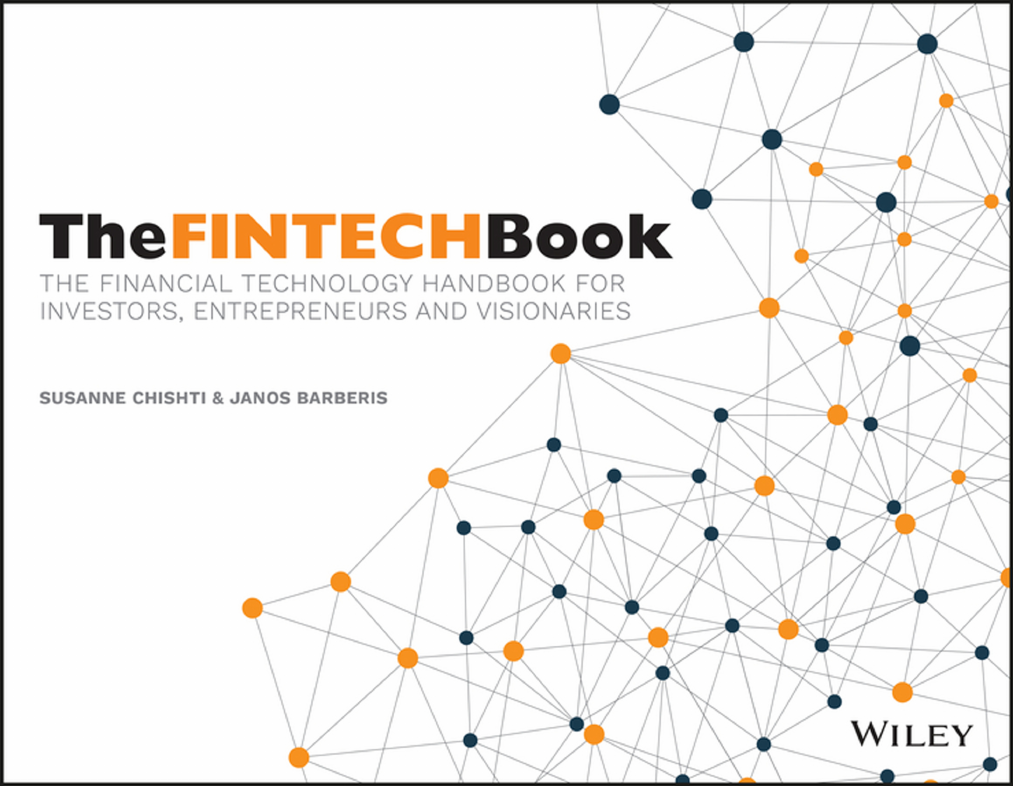

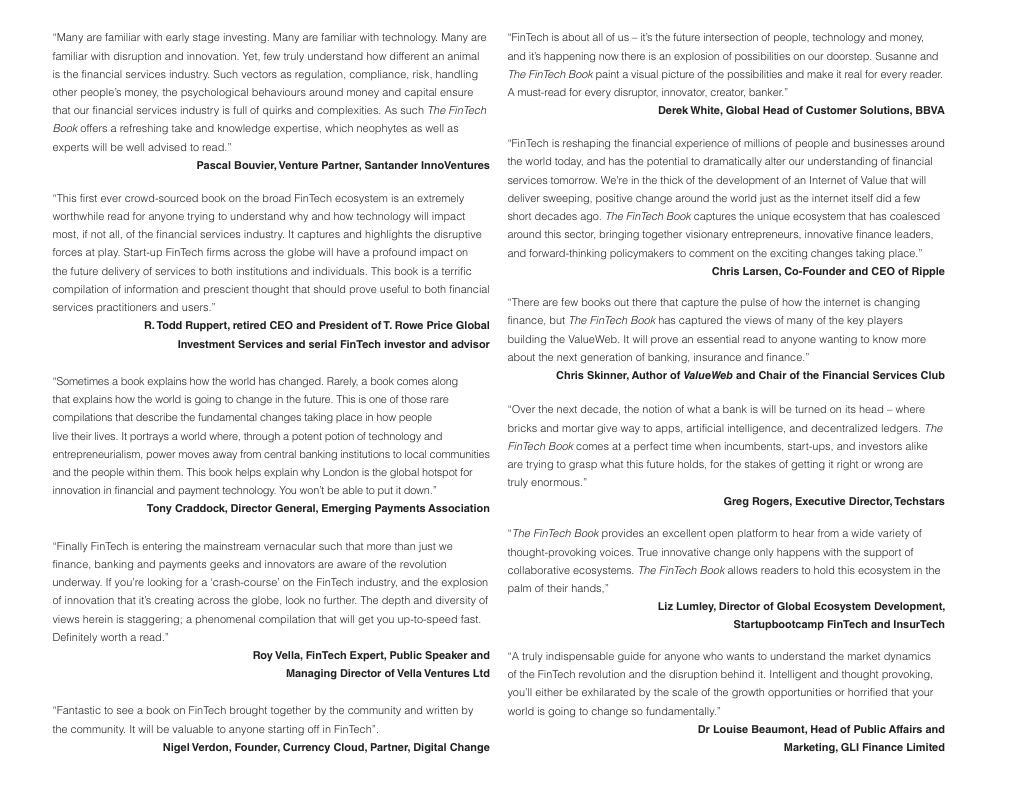
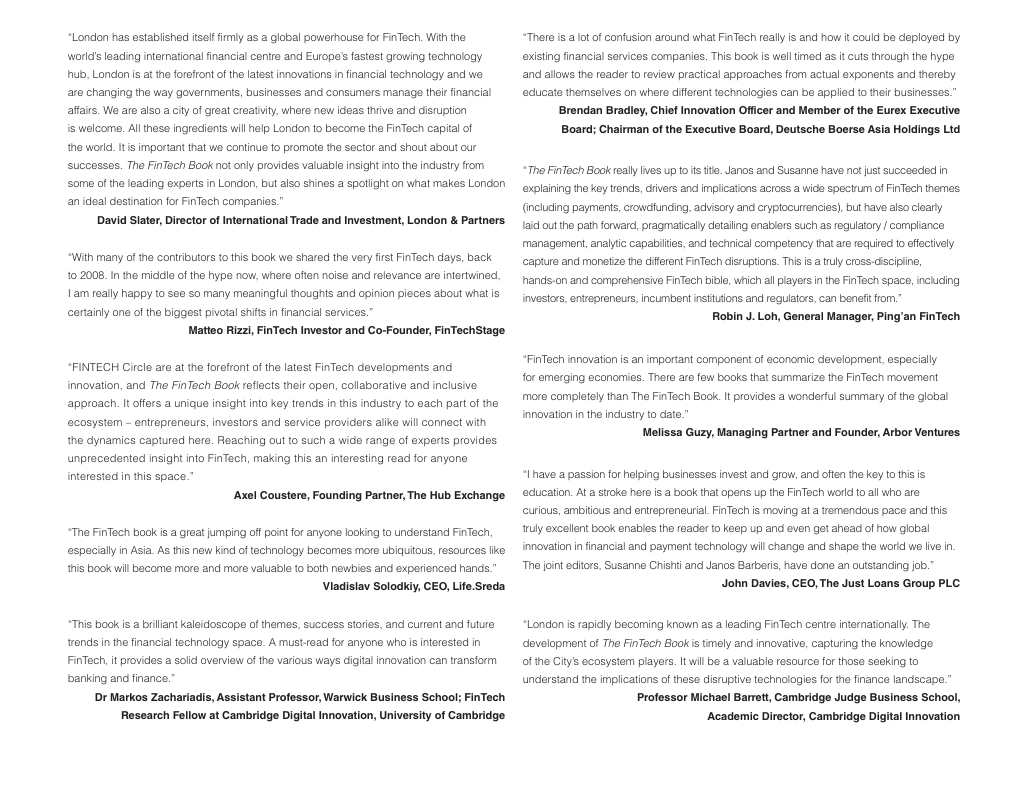
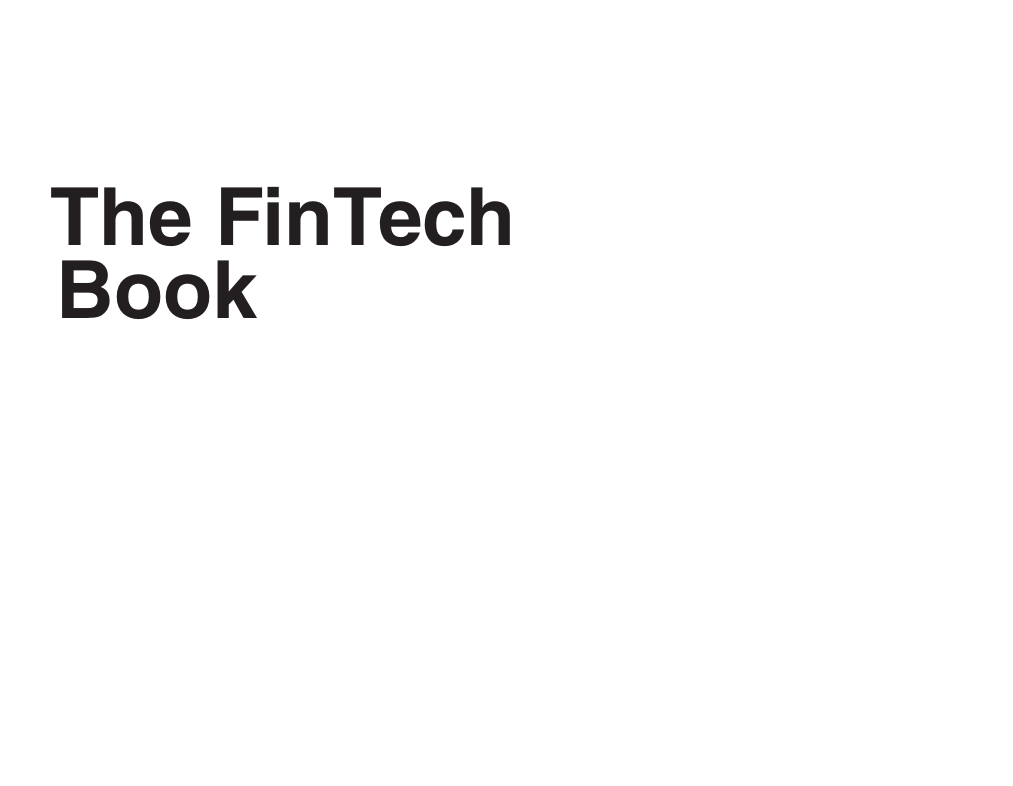
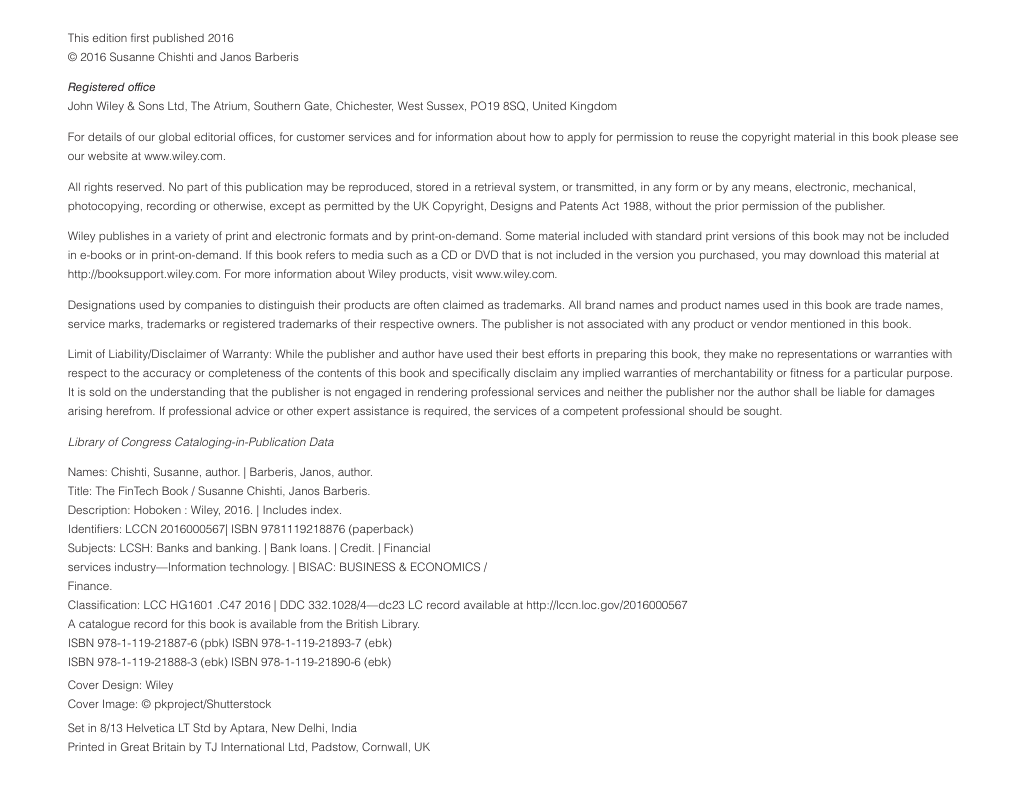
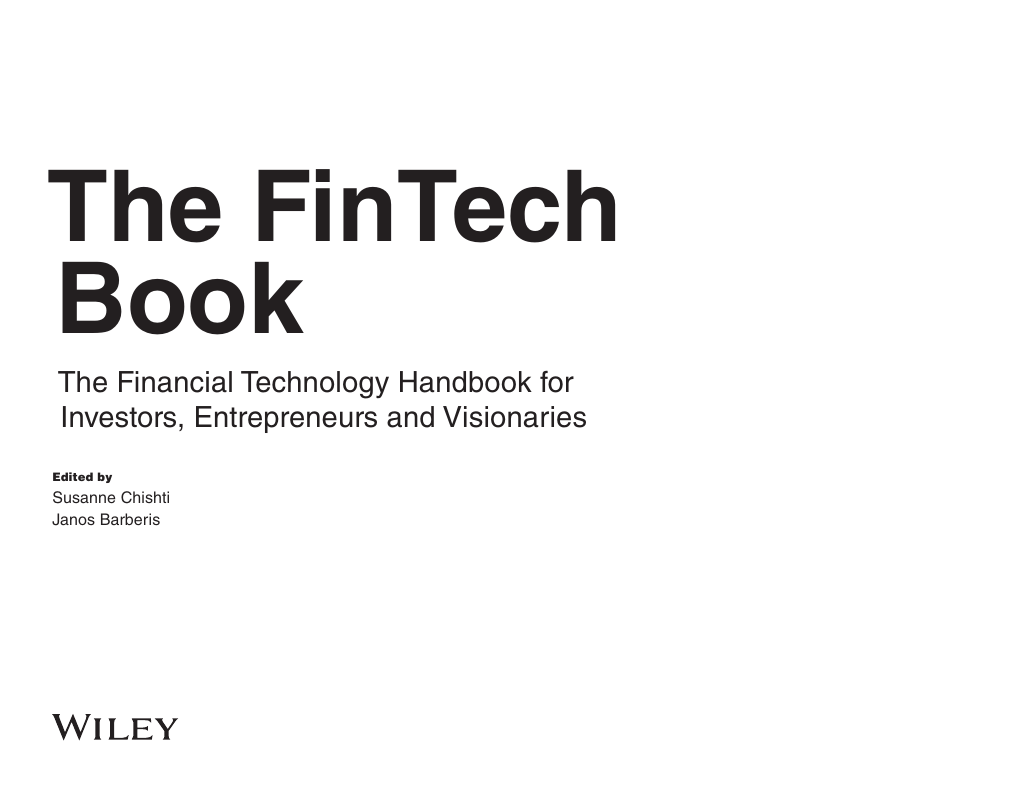









 2023年江西萍乡中考道德与法治真题及答案.doc
2023年江西萍乡中考道德与法治真题及答案.doc 2012年重庆南川中考生物真题及答案.doc
2012年重庆南川中考生物真题及答案.doc 2013年江西师范大学地理学综合及文艺理论基础考研真题.doc
2013年江西师范大学地理学综合及文艺理论基础考研真题.doc 2020年四川甘孜小升初语文真题及答案I卷.doc
2020年四川甘孜小升初语文真题及答案I卷.doc 2020年注册岩土工程师专业基础考试真题及答案.doc
2020年注册岩土工程师专业基础考试真题及答案.doc 2023-2024学年福建省厦门市九年级上学期数学月考试题及答案.doc
2023-2024学年福建省厦门市九年级上学期数学月考试题及答案.doc 2021-2022学年辽宁省沈阳市大东区九年级上学期语文期末试题及答案.doc
2021-2022学年辽宁省沈阳市大东区九年级上学期语文期末试题及答案.doc 2022-2023学年北京东城区初三第一学期物理期末试卷及答案.doc
2022-2023学年北京东城区初三第一学期物理期末试卷及答案.doc 2018上半年江西教师资格初中地理学科知识与教学能力真题及答案.doc
2018上半年江西教师资格初中地理学科知识与教学能力真题及答案.doc 2012年河北国家公务员申论考试真题及答案-省级.doc
2012年河北国家公务员申论考试真题及答案-省级.doc 2020-2021学年江苏省扬州市江都区邵樊片九年级上学期数学第一次质量检测试题及答案.doc
2020-2021学年江苏省扬州市江都区邵樊片九年级上学期数学第一次质量检测试题及答案.doc 2022下半年黑龙江教师资格证中学综合素质真题及答案.doc
2022下半年黑龙江教师资格证中学综合素质真题及答案.doc